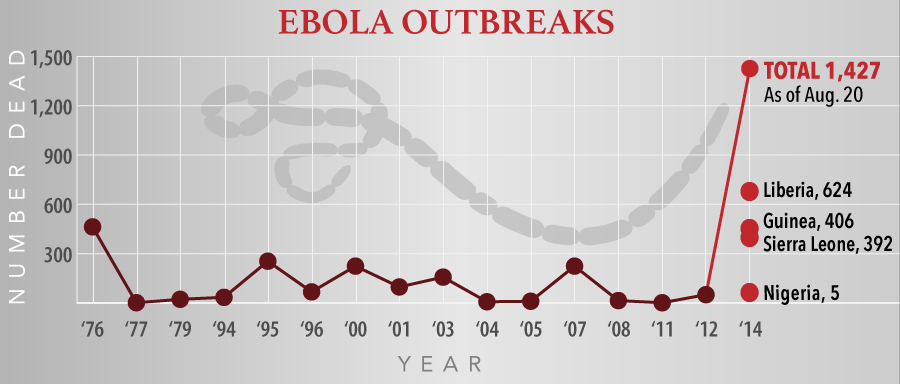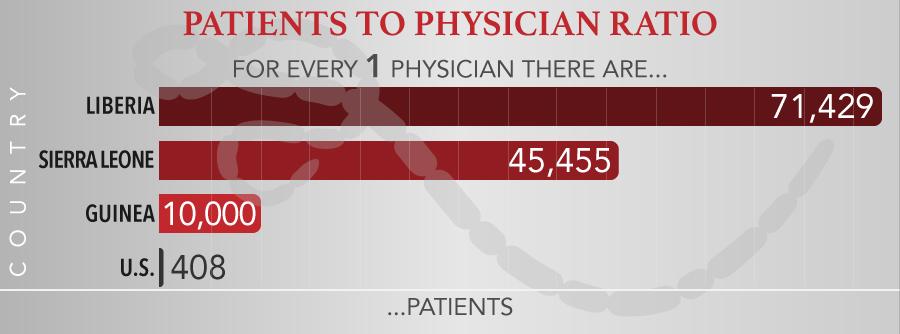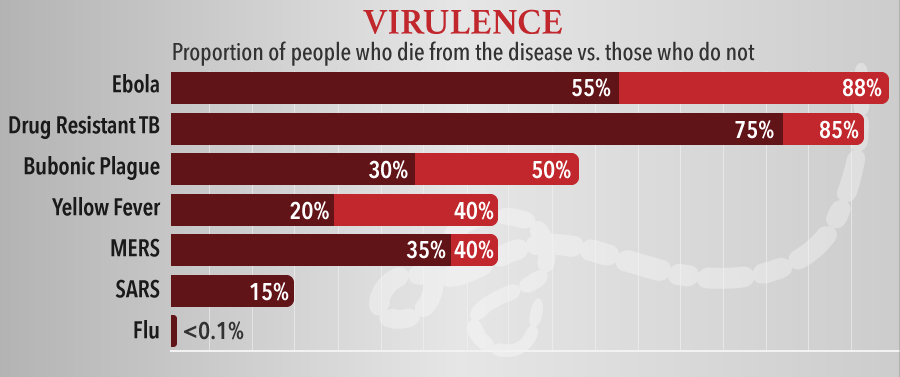The August 2014 Ebola outbreak is the largest Ebola outbreak in the known history of the disease, and the first in West Africa. The disease, as everyone knows by now, is insidious; a vicious killer, and in one month alone, of the more than 2,500 people diagnosed with the disease, more than 1,400 have died.
In the very beginning, in 1976, when the disease was “discovered” along the Ebola River in Zaire there were two strains. The first had a mortality rate of 53%; the second, also in 1976, had an astounding mortality rate of 88%. That meant essentially, if you caught the fever, you died. And died horribly. But the disease was confined to central equatorial Africa.
[Tweet “There has not been any community transmission of Ebola outside Africa”]
Until August 2014. Heretofore the major Ebola outbreaks were confined to the African countries of the Democratic Republic of Congo (formerly known as Zaire), Sudan, Gabon, and Uganda. Which begs the question: Now that Ebola has been transmitted to West Africa, will Ebola be the next pandemic? That’s what has the entire world on edge: closing down flights to and from the affected countries in Africa, neighboring countries closing borders with neighbors, and has Europe and the Americas on watch.
For example: Patrick Sawyer, an American who contracted the virus, would have boarded a plane to Minnesota had he not died in Lagos, Nigeria. He had flown from Liberia to Ghana to Togo before arriving at Nigeria’s largest city. Modern borders in Africa are as porous as the number of flights, goods and people that cross them. In other words, they are extremely permeable. Viruses are along for the ride, spreading farther than they ever have. And that is very scary.

Even the occasional disease flare ups in Uganda and the Congo in the early 2000s were still confined to central Africa. That’s why the outbreak in August 2014 in western Africa was so different, and menacing. The latest outbreak is affecting four West African countries: Guinea, Libera, Nigeria and Sierra Leone.
Ebola is not airborne. It is spread only by bodily fluids. By the time people become contagious, they are extremely ill and would quickly, under normal conditions in the U.S., come under medical care. Problem is, in a lot of the most affected African countries, there are very few physicians. And where there are doctors, hospital conditions are poor. Even surgical gloves are hard to come by.

There is one piece of good news amidst all the tragic deaths and fear. An organization called Risk Management Solutions has also asked the question, is Ebola the next pandemic, and their answer is “unlikely,” said Rebecca Vessenes, a senior quantitative modeler at RMS.
Virulence is a measure of how deadly a disease is, typically measured by the case-fatality rate (CFR), which is the proportion of people who die from the disease to those who do not. The current Ebola CFR averages 55 percent but has been as high as 88 percent. For comparison, the CFR for bubonic plague typically ranges from 25 to 60 percent. CFR for flu is typically less than 0.1 percent.

Based on the current number of reported cases, the World Health Organization has declared this outbreak, as horrible as it is, as a “public health emergency of international concern.” But not a pandemic. The WHO says the Ebola outbreak poses no “significant” risk to the U.S. public. But, how can we be sure?
“Even if the disease were to spread to other regions of the world”, Vessenes said, “Ebola is still considered a rare disease and the transmissibility is likely to be much lower due to quarantine and infection-control measures, even if the CFR remains high.”
There has not been any community transmission outside of Africa, and this is expected to continue.
There is even better news. On Aug. 25, a Canadian company, Immunovaccine Inc. said four monkeys survived the Ebola virus after being injected with a vaccine they had produced. The company said the monkeys survived a dose of Ebola virus that normally would have been lethal. Two other animals that did not receive the vaccine died within a week.
ZMapp, developed by Mapp Biopharmaceutical Inc. is an experimental treatment for use with individuals infected with Ebola virus. It was given to the two American missionary workers had the virus and appears to have saved their lives.
Whether or not Ebola is the next great plague is hard to say. If it is, it will subside at first and remain regional with devastating results in Africa. At some point, it will re-appear elsewhere and quickly spread internationally…. if it is the next pandemic.
Then again, the vaccines now being developed might just be what the doctor ordered.
Other source material:
http://web.stanford.edu/group/virus/filo/history.html
http://www.cdc.gov/vhf/ebola/resources/outbreak-table.html
http://www.abc.net.au/news/2014-07-31/ebola-timeline-deadliest-outbreak/5639060
http://www.rms.com/blog/2014/08/15/assessing-the-risk-of-a-global-ebola-pandemic/